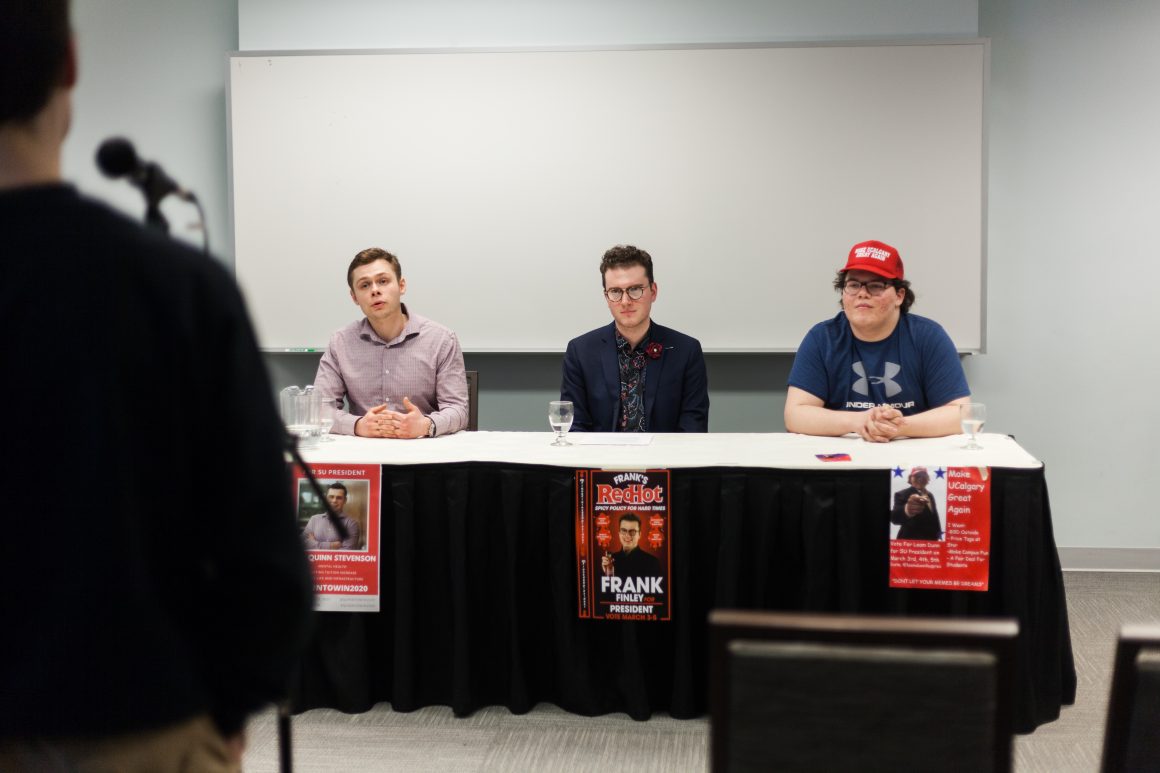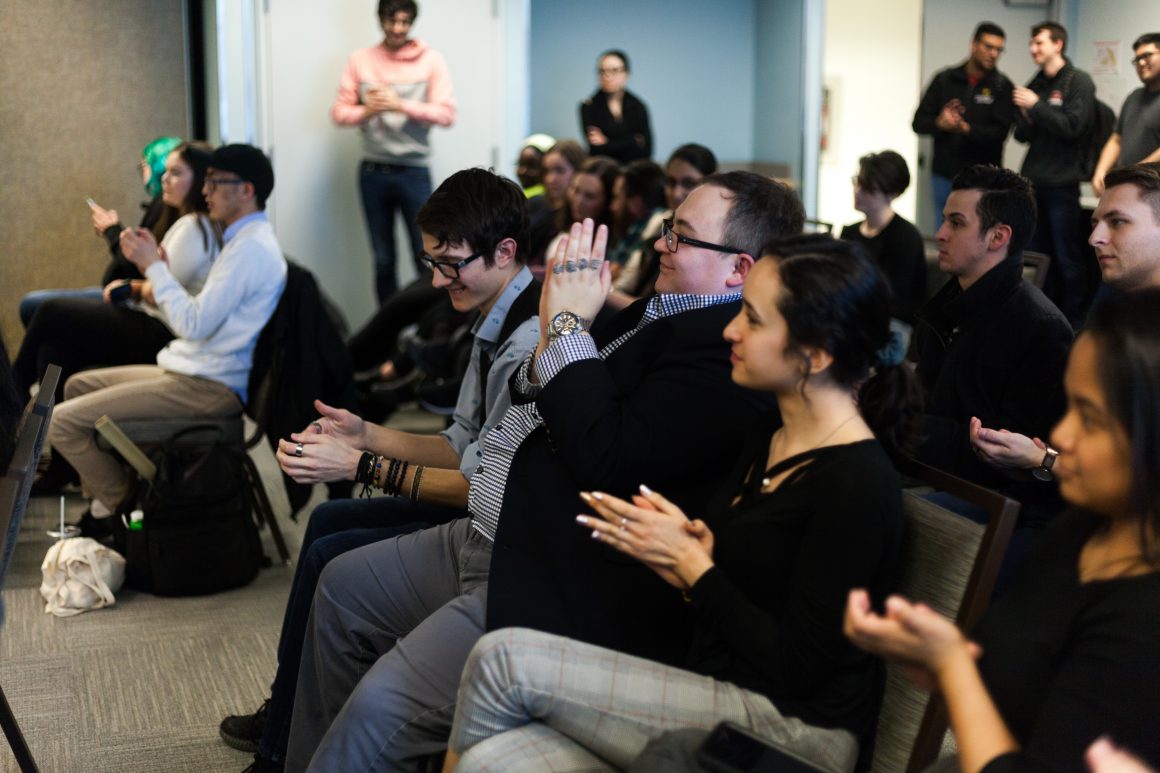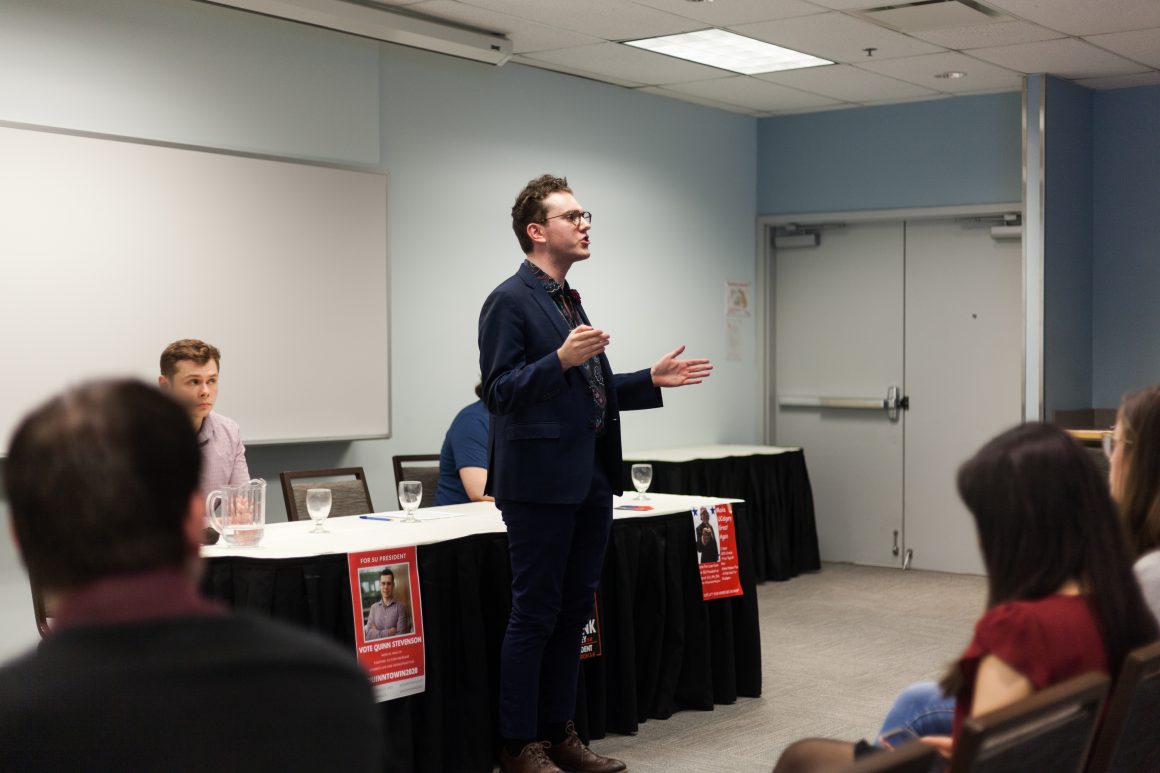
Memorable moments from the 2020 Gauntlet Presidential Debate
By Gayathri Peringod, March 2 2020—
The Students’ Union’s General Election Presidential Debate, hosted by the Gauntlet, took place on Feb. 26. The debate was lively, impassioned and wildly entertaining. The format of the debate included opening statements from each candidate, questions from debate moderator and Gauntlet Editor-in-Chief Kristy Koehler, rebuttals and audience questions.
If you missed it, here are some memorable moments from the debate:
Opening Statements
Frank Finley kicked things off by outlining the current state of campus politics as he saw it, recounting his political background, and reiterating that his stance as President would be an assertive one. Finley emphasized his eligibility for the position and summed up his opening statement, but not without telling the audience that the campus will have to be “a bit spicy” this election season, a winking nod to his campaign slogan.
Quinn Stevenson was next, using his opening statement to reiterate and outline his platform points, emphasizing three key themes: mental health, infrastructure and university transparency. He concluded by outlining his plans to use the President’s Consultative Task Force (PCTF) – a group of students consulting the SU President on student needs – to improve the inclusivity of the campus environment.
Leam Dunn was last, emphasizing the comedic nature of his campaign by starting his statement with, “My name is Leam and I like memes.” Acknowledging that his campaign started as a joke, Dunn went on to state that the process of running for President has led him to become more immersed in the campus community and hear student concerns. Dunn runs on a platform of ‘practical solutions,’ citing his interest in instituting price tags at the Stör and making Bermuda Shorts Day an outside event. He wrapped up by saying that he was running for the people and hoping to bring “small solutions to small problems.”
Questions from the EIC
The first question was about what mental health resources looked like to each candidate, inviting candidates to be specific.
Stevenson spoke first.
“What mental health resources means for me is whatever an individual is seeking to improve their quality of life. That can be counseling, that can be medication, that can be spending time out in nature.”
He went on to emphasize that the recent budget cuts will require him to be more vigilant about mental health funding, ensuring that students have adequate access to mental health resources.
Dunn stated his agreement with Quinn, as well as his desire to expand it further.
“Mental health is not just what happens inside your brain. It’s the environment that you’re in. We currently live in what people have called a commuter campus, and people feel miserable on campus. This isn’t a place where people feel like it is home to them. And that’s what my campaign strives to do.”
Finley took his allotted time to outline his plan for increasing the Hardship Assistance Fund and donating more resources to the Food Bank, stressing that an important part of mental health is tackling preventative measures. Finley also stressed his interest in “per capita” mental health funding, not a broad institution mental health grant, as well as his interest in increasing cultural accessibility for students to feel more comfortable speaking to a Wellness Centre counsellor.
The second question was whether the candidates believed the SU needed to be political at this time, or remain a non-partisan organization.
“The SU should always remain apolitical. I know it’s funny, me saying that, but it should always be apolitical and always in service to the students,” said Dunn.
Stevenson echoed Dunn’s sentiments.
“If we take a side on either side of the political spectrum, what happens when the next government gets elected? … If we get too political too fast, we need to understand that the province holds all the power. If we walk in too aggressive, they can always say no; if we walk in too aggressive, they will no longer consult with us.”
However, Finley disagreed.
“When I worked for the Premier’s office, I noticed something interesting and I don’t think this is going to be shocking. But the government would much rather step on a mouse than step on a lion.”
“These cuts don’t just happen,” Finley continued. “We build relationships where we can, but at the end of the day, yes, it is a political fight. Of course, we remain non-partisan. But we have to be political. That is the entire point of this.”
The next question was on how candidates planned to improve student engagement.
Stevenson responded that he would use his consultative task force to listen to the students’ voices, as well as use social media to direct students’ attention to the SU’s initiatives and speaking to them one-on-one.
Dunn pointed to his already-high social media engagement in alternative forms of social media, drawing attention to a fellow Redditor’s idea of establishing a weekly forum with the President and other executives. His answer also marked the memorable quote, “One fantastic idea I heard on Reddit…”.
Finley also pointed to the PCTF, as well as setting aside five hours a week to venture into the community and ask students what was on their minds.
When asked about why the candidates feel they can make a difference regarding budget cuts, Stevenson emphasized his collaborative and assertive qualities, while Finley stressed his political acumen and demonstrated assertive nature.
Dunn, however, stated quite simply, “I don’t think there’s much the SU can do to combat that,” going on to say that the SU President was meant to be more of an advocate than an implementer. In rebuttal, Finley responded that while he is sympathetic to this concern, that he believes much can be done to force the hand of those “cozying up” to the provincial government.

Audience Q&A
Memorably, current VP Student Life Alisha Gordon asked Leam Dunn where he would hold Bermuda Shorts Day outside in light of limited spaces for the event on campus.
“I was watching a YouTube video of a bunch of vintage Bermuda Shorts Days, and they held them right outside of the Olympic Oval, and in that Dining area, all up in there. So that’s where I’m planning on having the BSD,” Dunn replied. “Close to residence, so, if you’re getting a little… too far deep, it’s not that far of a walk to get home,” Dunn finished, to a round of chuckles.
“And how much money would you be willing to spend on it, if you were elected?” Gordon asked.
“25 dollars.”
“Uh, for the whole event?” Gordon clarified.
“Yes,” said Dunn, to another round of laughs. “Saving money… saving lives.”
The next audience member identified himself as a “queer and a Romani,” and asked what the candidates would do to stand up for those like him in response to the UCP’s history of targeting minorities such as himself.
Stevenson began by acknowledging his lack of understanding of the issues affecting minorities, not being one himself, and pointed to his platform point of utilizing the PCTF to hear from minority voices and advocate for them.
“I do not have the solution because I have not lived your life, but I would like to hear from you personally to advocate on your behalf so that I do make your life better,” Stevenson said to a round of applause from the audience.
Finley said, “I’m not going to lie. I know what it’s like a lot of the time, to walk down the street and get called a fag, as it happens to me sometimes.
“With regards to what the SU can do, you use these subcommittees, the PCTF, to directly reach out to the communities whom you are trying to represent. You make that real effort because, guess what — if you have somebody who’s been booted out of their home, who has lost their connections, who has nowhere to go, you have to be willing to go to them.”
Dunn stated, “I won’t joke about this, but I agree with them. I don’t believe any one person can speak for a whole group, especially a whole campus.”
Another notable question was whether the SU should, as Finley previously advocated, unite with other labour unions across the province in protesting budget cuts.
Stevenson said no.
“I went through the [unions’] priorities, and I was struggling to find any overlap. CAUS (Council of Albertan University Students) in itself is debating what priorities it should bring to the provincial government.
“If we’re bringing in full-time employees and trying to work with them, we’re going to spend most of our resources and delegation of time trying to sort out priorities with them than we are going to the government.”
Dunn echoed Stevenson’s sentiments.
“As a union, we’re supposed to represent the students, not the students… and also the teachers and also the nurses. We want the student voice heard, we want the students to be in charge.”
Finley disagreed.
“I ask everybody in this room to think about nursing students and education students and social work students who are looking for jobs at the university. There is direct overlap between what we want as an organization, what CAUS and for that matter CASA (Canadian Alliance of Students’ Associations) want as an organization. It all comes down to public funding of public services… it can be as simple as a phone call.”
Closing Statements
Dunn ended with, “I can’t offer you the moon. That’s what I ran off of. I can solve the small things… I can’t get the Alberta government to bend to my whim, but I can get price tags at a convenience store, I can get a party outside, and I can hopefully increase students wanting to be on campus.”
Finley stood up from the table to deliver his closing statement.

“I don’t think that it is radical to push back against a government that is cutting postsecondary institutions… I don’t think that it is radical to think that students should go without food. I don’t think that it is radical to expect that every student should be able to have a roof over their head… and if those things are radical, then I suppose I am as well,” Finley said, to a round of whoops and cheers.
Stevenson was after Finley, joking, “Well, it’s very hard to follow that up,” and excusing himself to go to the bathroom shortly afterwards to laughter and applause.
You can view the video from the event here.
—
Voting days for the 2020 SU General Election are March 3–5. Students can vote through their my.ucalgary.ca page or at in-person voting booths. View all candidates’ platforms here.
